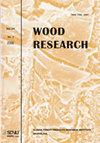EFFECTS OF PRESSING TEMPERATURE AND COMPRESSION RATIO ON DENSITY DISTRIBUTION AND HARDNESS OF SURFACE DENSIFIED POPLAR WOOD
IF 1
4区 农林科学
Q3 MATERIALS SCIENCE, PAPER & WOOD
引用次数: 0
Abstract
Process parameters play an important role in wood surface densification. In this study, the poplar (Populus tomentosa Carr.) wood was heated on one side at 100℃, 150℃ and 180℃, and compressed in the radial direction with the speed of 10 mm/min. The initial thickness of the wood samples were 30 mm, 26 mm and 23 mm, and they were all compressed to 20 mm and resulting in three different compression ratios: 33.3%, 23.1% and 13.0%. When the surface densification completed, the density distribution and hardness of the densified and un-treated samples were measured and analyzed. Results show that the compressing temperature mainly decided the formation of the density distribution curve and the peak density increased with the increasing temperature; as the compression ratio increased, the peak density increased and the thickness of the densified zone broadened; the surface hardness was highly correlated with the density distribution which was affected by temperature and compression ratio, and as the peak density increased and the thickness of the densified broadened the hardness increased accordingly. Therefore, by optimizing the process parameters such as the compressing temperature and compression ratio could generate a targeted density distribution which has the desired hardness.压制温度和压缩比对表面致密杨木密度分布和硬度的影响
工艺参数对木材表面致密化有重要影响。在本研究中,对白杨(Populus tomentosa Carr.)木材在100℃、150℃和180℃下进行单侧加热,并以10 mm/min的速度进行径向压缩。木样初始厚度分别为30 mm、26 mm和23 mm,压缩后均为20 mm,压缩比分别为33.3%、23.1%和13.0%。当表面致密化完成后,测量和分析致密化和未处理样品的密度分布和硬度。结果表明:压缩温度主要决定了密度分布曲线的形成,峰值密度随温度的升高而增大;随着压缩比的增大,峰值密度增大,致密区厚度变宽;表面硬度与密度分布高度相关,密度分布受温度和压缩比的影响,随着峰值密度的增大和致密化层厚度的展宽,硬度随之增大。因此,通过优化压缩温度和压缩比等工艺参数,可以得到具有所需硬度的目标密度分布。
本文章由计算机程序翻译,如有差异,请以英文原文为准。
求助全文
约1分钟内获得全文
求助全文
来源期刊

Wood Research
工程技术-材料科学:纸与木材
CiteScore
2.40
自引率
15.40%
发文量
81
审稿时长
5.4 months
期刊介绍:
Wood Research publishes original papers aimed at recent advances in all branches of wood science (biology, chemistry, wood physics and mechanics, mechanical and chemical processing etc.). Submission of the manuscript implies that it has not been published before and it is not under consideration for publication elsewhere.
 求助内容:
求助内容: 应助结果提醒方式:
应助结果提醒方式:


